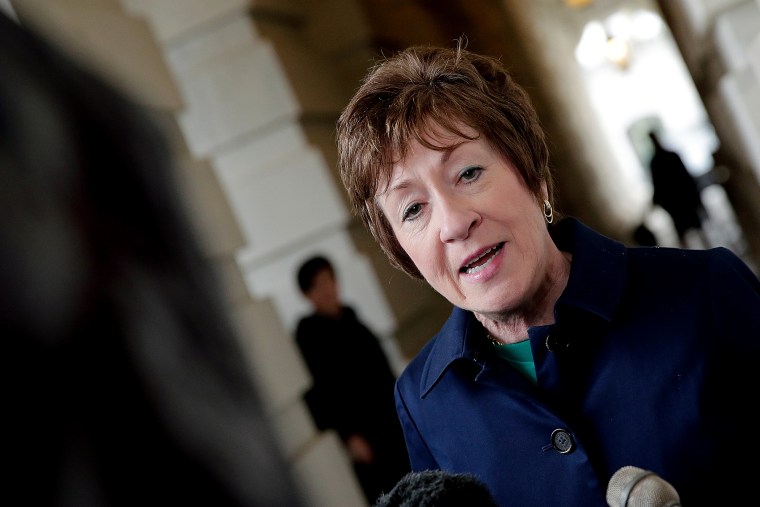As this morning got underway, there were four undecided senators who would decide the fate of Brett Kavanaugh's Supreme Court nomination. Now, there are none.
Sen. Susan Collins, who had been the last undecided Republican vote on Supreme Court nominee Brett Kavanaugh, announced Friday she will vote in favor of President Donald Trump's pick, probably ensuring his confirmation when the full Senate holds the final vote on Saturday.In a speech on the Senate floor that lasted more than 40 minutes, Collins, a Maine Republican, forcefully outlined her belief that Kavanaugh was well-qualified, that the Senate confirmation process "is not a trial" and that she "cannot abandon" the "presumption of innocence."
The Maine Republican's surprisingly long speech was, at times, alarmingly naïve about the kind of justice Kavanaugh could be. At one point, for example, Collins declared, "My fervent hope is that Brett Kavanaugh will work to lessen the divisions in the Supreme Court so that we have far fewer 5-4 decisions."
As if an overt partisan, who last week peddled Republican conspiracy theories, and who's played partisan roles throughout much of his career, can credibly be counted to "lessen the divisions" on the nation's highest bench.
Collins' lengthy defense of Kavanaugh and her support for his nomination suggested the GOP senator wasn't especially "undecided" after all.
Almost immediately after Collins ended her remarks, Sen. Joe Manchin (D-W.Va.), the only remaining senator who hadn't taken a position on the nominee, announced that he too would support Kavanaugh's nomination. At that point, the conservative West Virginian's vote was no longer consequential -- Collins was the 50th "yes" vote, guaranteeing Kavanaugh's confirmation no matter what Manchin decided.
Barring an 11th-hour change of heart, the Senate will hold a final vote tomorrow afternoon -- sooner, if senators decide there's no longer any point in dragging this out -- and Donald Trump's nominee will have the support needed to take his lifetime position on the Supreme Court. He will have one Republican opponent (Alaska's Lisa Murkowski) and one Democratic supporter (West Virginia's Joe Manchin).
There will be plenty of time to consider the short-term electoral consequences of the developments, but I find myself thinking this afternoon about something Dr. Christine Blasey Ford told the Senate Judiciary Committee last week.
"I was calculating daily the risk-benefit for me of coming forward," the professor explained, "and wondering whether I would just be jumping in front of a train that was headed to where it was headed anyway and that I would just be personally annihilated."
Eight days later, the train is, in fact, headed to where it was headed anyway.
Republicans didn't refute Ford's story; they simply decided not to let it influence their opinion of her alleged attacker.
Fifty-one senators heard Kavanaugh lie repeatedly. They heard him peddle partisan conspiracy theories. They confronted credible allegations against him. They reviewed his highly controversial views about shielding presidents from legal scrutiny. And they nevertheless concluded to give him the powerful job anyway.
History will not be kind.
